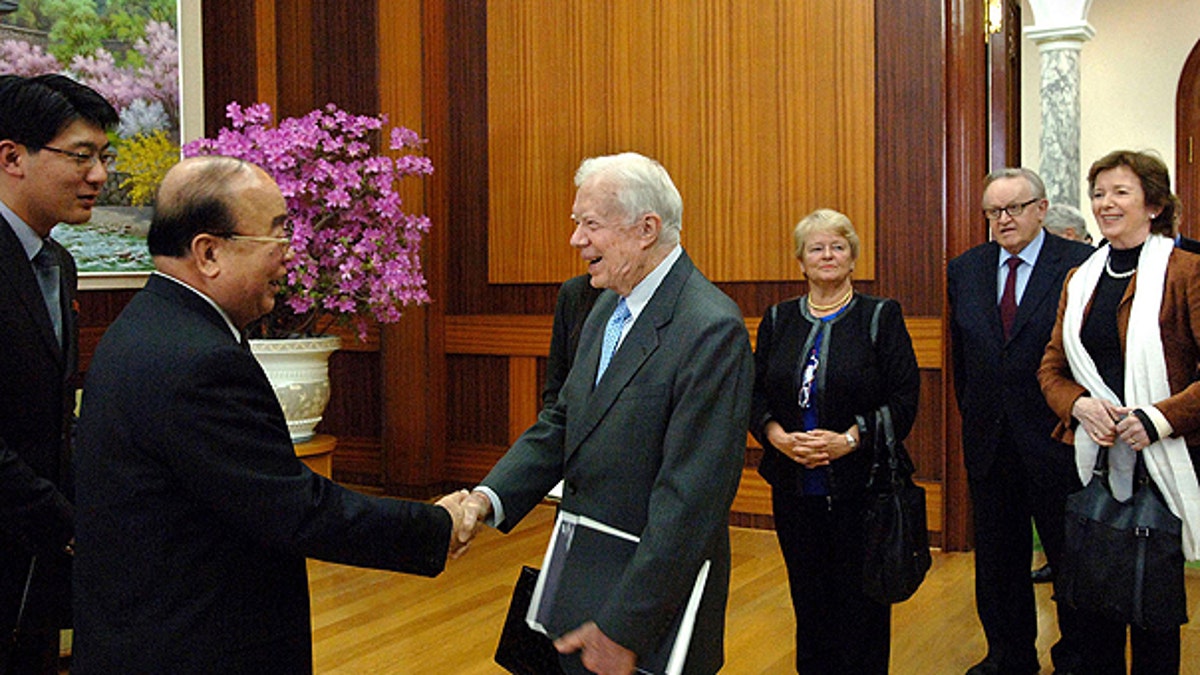
April 26: n this photo released by Korean Central News Agency via Korea News Service in Tokyo, former U.S. President Jimmy Carter, center, is greeted by Pak Ui Chun, second left, North Korea's foreign minister, in the Paekhwawon state guesthouse in Pyongyang, North Korea. (AP)
SEOUL, South Korea -- Former President Jimmy Carter on Thursday accused the United States and South Korea of violating human rights against North Korea by withholding food aid.
"One of the most important human rights is to have food to eat," Carter said at the end of his three-day visit to Pyongyang. "And for the South Koreans and the Americans and others to deliberately withhold food aid to the North Korean people because of political or military issues not related is really indeed a human rights violation."
South Korea links aid resumption to progress in relations with North Korea. It says better ties largely depend on Pyongyang taking responsibility for past attacks.
Washington says it's still considering North Korean requests for food, which officials say are evaluated on the basis of need, resource availability and the ability to monitor food distribution.
"This policy is consistent with our long-standing goal of providing emergency humanitarian assistance to the people of countries around the world where there are legitimate humanitarian needs," Darragh Paradiso, a spokesperson for the State Department, said Thursday. "The United States remains concerned about the well being of the North Korean people."
Years of poor harvests, a lack of investment in agriculture and political isolation have left people in the North severely vulnerable to starvation.
Former Irish President Robinson said many in the North need help now. She said the country is facing a "matter of utter life and death urgency."
Carter also demanded U.S. security guarantees in return for North Korea abandoning its nuclear weapons programs.
Carter, who traveled with three former European leaders, said in a blog post that North Korea insisted during the visit that it wants to improve relations with the United States and is willing to talk with Washington and Seoul without preconditions.
"The sticking point -- and it's a big one -- is that they won't give up their nuclear program without some kind of security guarantee from the U.S.," he wrote in a message posted Wednesday night.
That's an apparent reference to North Korea's claim that its atomic weapons programs deter the United States and South Korea from staging a northward invasion that would allow Seoul to rule the entire Korean peninsula.
Carter is well-respected in North Korea for his role in helping work out a 1994 nuclear deal that may have averted a war. But officials in Seoul and Washington have put little stock in his ability to engineer a breakthrough in the long-stalled, acrimonious nuclear negotiations.
Han Sung-joo, South Korea's foreign minister during Carter's 1994 trip, said in an interview that "both South Korea and the U.S. government are a little bit wary of Mr. Carter trying to represent North Korea in a better light than it actually is."
Despite widespread skepticism, however, interest was still high in whether the Nobel Peace laureate might thaw ties between North Korea and the outside world.
Carter and the former leaders of Finland, Norway and Ireland met with the foreign minister and the president of the North's parliament.
Carter's group waded into a difficult situation: It has been more than two years since nuclear negotiators from the United States and neighboring nations last met with the North in an effort to persuade it to abandon its atomic weapons programs.
Since then, the North has conducted missile and nuclear tests and proudly unveiled a new nuclear facility that could give it another way to make atomic bombs. Late last year, the North Korean military rained artillery shells on a front-line island, killing two South Korean civilians as well as two marines. Seoul also accuses Pyongyang of sinking a warship in March 2010, killing 46 South Korean sailors.
North Korea has also made progress in building what could be a light water nuclear power reactor, according to commercial satellite imagery taken in early March but released Thursday by the Institute for Science and International Security in Washington. While ostensibly for civilian energy purposes, such a reactor gives the North reason to enrich uranium that could be used in atomic weapons.
The United States says it won't push forward on nuclear talks until South Korea is satisfied that the North has taken responsibility for last year's bloodshed. North Korea has shown no willingness to apologize and denies involvement in the ship sinking.
Enter Carter, 86, whose credentials as a North Korea specialist largely stem from his drama-filled trip to Pyongyang in 1994. At the time, the North had expelled international nuclear inspectors and was threatening to destroy Seoul. Many feared war would erupt.
Carter, traveling with then President Bill Clinton's approval, met directly with Kim Il Sung, the country's revered founder and father of the current leader, just weeks before the president's death.
Those talks set up U.S.-North Korean negotiations that resulted in a deal that called for freezing the North's nuclear facilities in exchange for proliferation-resistant power reactors. The accord fell apart in 2002, after the George W. Bush administration claimed North Korea had embarked on a secret uranium enrichment program.
Carter traveled this week as a private citizen. The State Department said he was carrying no special messages.
South Korea played down the visit, saying it didn't have high hopes that Carter's trip would change North Korea's attitudes.
But Carter's trip could also be valuable at a time when, with few official contacts, determining Pyongyang's motivations and goals is often guesswork and left to unofficial envoys.
The Associated Press contributed to this report.




















